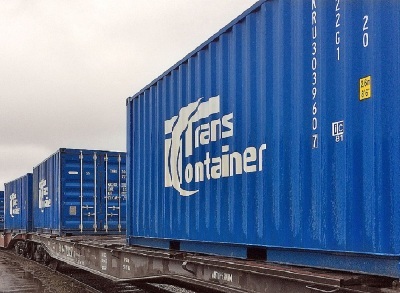Forbes estimates Roman Abramovich and Aleksandr Abramov’s personal fortunes at US$12.4B and US$6.2B respectively. Vladimir Lisin is believed to be even richer with US$21.3B.
Meanwhile, Delo’s owner, Sergey Shishkarev, reportedly had no own funds of his own in the auction – last year, Delo bought a 30.75% stake in Global Ports (GP), the Russian port sector’s major player, for an estimated US$240M. Before that Delo focused mainly on the development of its transport and logistics assets based at the Russian Black Sea harbour of Novorossiysk.
Brushed off by his rivals, Shishkarev was able to borrow funds from Sberbank, one of Russia’s key lenders. He fought to the finish and won the 120-plus-step battle (the initial increment was Rub 141M (US$2.2M) and all of the successive steps Rub 200M (US$3.1M) each).
Set up in 2006, TransContainer accounts for around half the overall volume of rail container transportation in Russia. It operates 46 owned terminals all over Russia and 19 in Kazakhstan, co-owns the Central Asian country’s largest rail terminal operator KedenTransService, and one terminal in Slovakia. It has around 64,500 high-capacity containers and runs a fleet of more than 24,000,000 flatcars to transport them.
The company reported a 58% year-on-year growth in its net incomes (to Rub10.485B or US$163M) during the first nine months of the current year. Its total revenues increased by 14.4% to over Rub 63.762B (US$991.45M) over the three quarters period.
As of 30 September 2019, TransContainer’s assets were estimated at Rub75.465B (US$1.173B), while total debt amounted to Rub11.570B (US$179.91M). It posted about US$146M of net profit for 2018, up 45.5% year-on-year, its assets estimated at US$1B.
“Control over TransContainer coupled with Delo’s presence on the country’s Black Sea, Baltic and Pacific coasts will help us evolve into a nationwide logistics transport integrator,” said Shishkarev.
Before the auction, Shishkarev called on domestic freight forwarders to pay more attention to the sea arm of multimodal transportation schemes. While oreign lines account for the bulk of container shipping from Russia’s seaports, Russian players should, according to him, be able to compete at least with Greek and Turkish shipping operators in Novorossiysk-Mediterranean sea lanes.
This year, Delo has completed construction of deepwater berth No. 38 at its Novorossiysk-based NUTEP container terminal, which is expected to help avoid double cargo handling at Mediterranean harbours and reduce cargo transportation costs.
In addition, Delo, along with Maersk, launched a transcontinental multimodal container service this year. It takes 18 days to deliver containers from South Korea to Poland’s port of Gdansk, including 14 days of overland transit across Russia from the Pacific harbour of Vostochny to Saint Petersburg on the Baltic shore.


